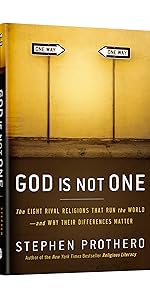Customer Services
Copyright © 2025 Desertcart Holdings Limited


God Is Not One: The Eight Rival Religions That Run the World [Prothero, Stephen] on desertcart.com. *FREE* shipping on qualifying offers. God Is Not One: The Eight Rival Religions That Run the World Review: educación nísperos tirón and perhaps a bit of transformation - If you are a person that loves to learn and grow and therefore contribute more in life. Then this book will not only equip you but empower you too. This book tries and succeeds in reporting and describing the different religions in a factual adoring way. In how they are similar and different. In how they all have extremes and extremist and how they all have the mystical and ephemeral aspect. He dos a marvelous job talking about the values and beliefs, way of being exemplars in each one in a compare and contrast format but also in a high light manner as this book would be way too long otherwise. He succeeds in dice ting the different religions in terms of these term eloquently. He also points out that heaven, for some, is in the here and now and being human and doing human is the end goal. But also points to what some religions emphasize that here and now only matter to get to a different place. R that good conduct, social behavior, is in itself the key. There is a religious way of talking about religions which in a late night conversation at a bar can turn into a fight and then there is the secular an reporting way which this book exemplifies that allows one to not only experience and learn but also to question and evolve. Stephen is articulate and witty through out the book. I would highly recommend this book to only those that care about humanity and want to explore. Thank you for the brilliant book Jorge Henriquez Mexico City Review: Great book on religions as a whole - I highly recommend this book to anyone who has an interest in religions, but i especially recommend it to anyone who has a hatred of any religion or anyone who thinks that their religion is the "one true religion". Atheists and Christians alike should check this one out. This book debunks the common misconception that "all religions are different paths leading to the same place". The author does his best to remain unbiased and does not place any one religion as more "right" than any other. Stephen Prothero's simple, easy to read, matter of fact approach simply seeks to inform readers about the goals and solutions of the top eight religions of the world, while at the same time acknowledging that there are good and bad things that come from religion. Overall, I think this book helps to promote understanding about religions as a whole and as a result promotes religious tolerance.



| Best Sellers Rank | #6,527 in Books ( See Top 100 in Books ) #4 in Sociology & Religion #5 in Comparative Religion (Books) #5 in Religion Encyclopedias |
| Customer Reviews | 4.4 4.4 out of 5 stars (1,353) |
| Dimensions | 5.31 x 0.9 x 8 inches |
| Edition | Reprint |
| ISBN-10 | 0061571288 |
| ISBN-13 | 978-0061571282 |
| Item Weight | 2.31 pounds |
| Language | English |
| Print length | 400 pages |
| Publication date | May 3, 2011 |
| Publisher | HarperOne |
J**Y
educación nísperos tirón and perhaps a bit of transformation
If you are a person that loves to learn and grow and therefore contribute more in life. Then this book will not only equip you but empower you too. This book tries and succeeds in reporting and describing the different religions in a factual adoring way. In how they are similar and different. In how they all have extremes and extremist and how they all have the mystical and ephemeral aspect. He dos a marvelous job talking about the values and beliefs, way of being exemplars in each one in a compare and contrast format but also in a high light manner as this book would be way too long otherwise. He succeeds in dice ting the different religions in terms of these term eloquently. He also points out that heaven, for some, is in the here and now and being human and doing human is the end goal. But also points to what some religions emphasize that here and now only matter to get to a different place. R that good conduct, social behavior, is in itself the key. There is a religious way of talking about religions which in a late night conversation at a bar can turn into a fight and then there is the secular an reporting way which this book exemplifies that allows one to not only experience and learn but also to question and evolve. Stephen is articulate and witty through out the book. I would highly recommend this book to only those that care about humanity and want to explore. Thank you for the brilliant book Jorge Henriquez Mexico City
F**I
Great book on religions as a whole
I highly recommend this book to anyone who has an interest in religions, but i especially recommend it to anyone who has a hatred of any religion or anyone who thinks that their religion is the "one true religion". Atheists and Christians alike should check this one out. This book debunks the common misconception that "all religions are different paths leading to the same place". The author does his best to remain unbiased and does not place any one religion as more "right" than any other. Stephen Prothero's simple, easy to read, matter of fact approach simply seeks to inform readers about the goals and solutions of the top eight religions of the world, while at the same time acknowledging that there are good and bad things that come from religion. Overall, I think this book helps to promote understanding about religions as a whole and as a result promotes religious tolerance.
M**L
Great overview of the eight religions, poor attack on atheism
The thesis of this book is to argue against perennialism. The author claims that each religion diagnoses the human condition with its own problem, and offers a unique solution. And that missing this fact by conflating them all as the same is to fail to respect their individual contributions. The majority of the book is short introductory chapters on each of what he considers the eight "great" religions. I found each of these chapters to be quite informative, given how short they are. I especially appreciated the chapters on Daoism and Yoruba religion. Most english language introductions to Daoism are very shallow and hardly go past the first line of the Daodejing, but this one was very informative and went into the history, different schools and the pantheon of Daoism. Yoruba I had never even heard of before reading this book, so I appreciate that he even included it at all. I have to subtract a star for a few reasons. One is that he manages to end the book with one of the most poorly argued polemics against atheism I've ever read. He considers atheism just another religion, and spends the majority of the chapter talking about what he calls "angry atheists" (i.e. the "New Atheists"). His reasons for categorizing atheism as a religion are very weak in my opinion. But leaving that aside if he's going to consider atheism a religion, I wish he would treat it with the same respect and charitability that he treats other religions with. He spends much more time focusing on Hitchens and Dawkins in the atheism chapters than he does on fundamentalists in the other chapters. The second reason I'm subtracting a star is that he doesn't address what I think is a primary form of perennialism. That is the belief, not that all religions are somehow equally true, but that the mystical experiences of the various contemplatives in those religions are the same experience. Maybe it was my fault for coming with bad assumptions, but this is the form of perennialism I was expecting him to argue against and it's not addressed at all in the book. Overall I would still recommend it as an enjoyable and accessible introduction to the eight religions he discusses.
D**Y
Outstanding
Stephen Prothero's "God is Not One" clearly lays out the key factors, development, and affects of each of the major religions in the world, including a brief note on Atheism. As a lapsed catholic constantly seeking understanding of different faiths both for personal and academic reasons, this book has been the most helpful I've read. Before reading, I had a fairly firm grasp of most Monotheistic religions and a beginners understanding of far eastern practices (mostly from "Tao of Pooh" and videos of the Dali Lama). This book stated as clearly as possible what divides and defines each of these religions and how they each interact with one another and affect our global relations. While extremely informative, it read much like a novel and everything was delivered in a flowing manner that was easy to follow which kept me turning the pages. I highly recommend this book to anyone with any interest in theology out of academic curiosity or personal spiritual development.
J**K
Die Lieferung erfolgte aus New Jersey, US, innerhalb von 6 Tagen. Das Buch war ein Geschenk an meine Freundin, die sehr glücklich darüber ist. Ihrer Aussage nach hat das Buch so einiges zu bieten. Wer ein Buch sucht, welches sich kritisch mit den verschiedensten Religionen unserer Welt auseinandersetzt, um sich über jene zu bilden, der scheint hier an der richtigen Stelle. Auch optisch macht das Buch etwas her. Im Umschlag ist es ein wirklich schöner Blickfänger, den man gerne im Bücherregal präsentiert und im bloßen Hardcover-Einband kommt es elegant und unauffällig daher. Für den Stil eines jeden Bücherregals findet sich hier also das passende Gewand.
A**R
It's an amazing book; I use it as an aid to teach my world religion lessons in my high school.
加**藤
宗教見取り図!分かりやすいです。
N**S
A good book but very thick so hard to read all in one go. I have taken to reading just the sections I want at the time I need to and going from there.
B**A
Für das Thema interessieren sich viele Menschen. Deshalb ist dieses aufschlussreiche Buch so wichtig. Es bringt in verständlicher Sprache umfassende Einblicke in die Ausrichtung und Ziele aller Hauptreligionen. Es rückt jeden Kuschelkurs, jede naive Einstellung zurecht und gibt Ausblicke, auf das was möglich ist und realistischer Weise erwartet werden kann - oder eben auch nicht.
Trustpilot
2 days ago
4 days ago